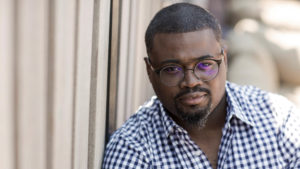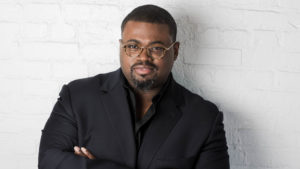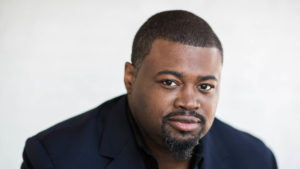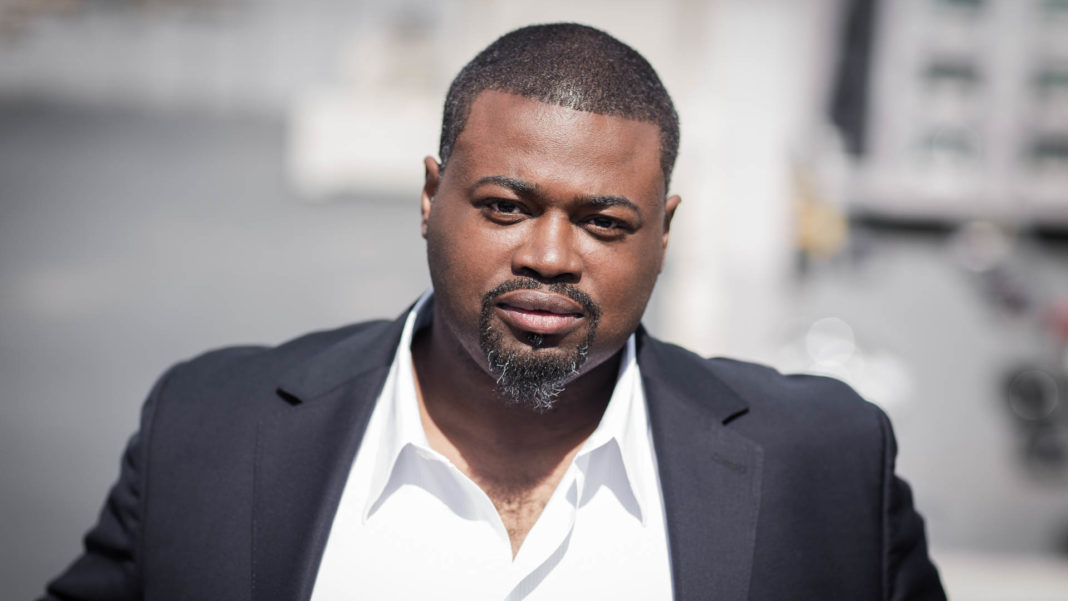It’s been a pivotal time in the career of tenor Russell Thomas. As one of the very few black tenors in opera it was inevitable that the opportunity to play Otello in Verdi’s opera would present itself sooner rather than later. And it has. Last October he made his role debut in two concert performances with the Atlanta Symphony Orchestra. He returns to the part this weekend when Gustavo Dudamel conducts the LA Philharmonic in a concert performance of Otello on Sunday at the Hollywood Bowl.
Thomas is not unknown to Los Angeles audiences. He performed the role of Lazarus in John Adams’ The Gospel According to the Other Mary and he was recently part of the LA Philharmonic’s performances of Gustav Mahler’s Das Lied von der Erde. So he has a familiarity with Dudamel that inspires him.
“He takes every single detail very seriously,” Thomas says by phone. “It was that way in Tosca, [Hollywood Bowl 2016], with the John Adams and the Mahler. Many conductors, especially younger ones, and he’s still considered a younger conductor, most conduct a recording in their head rather than what’s going on on stage. Just like some divas, many conductors don’t like to show up for staging rehearsals. When we did the staging of Gospel he was around at the onset with Adams. He would show up between rehearsals and performances. That seriousness or basic professionalism is what sets him apart from other people.”

Thomas found that there were two big challenges for him in tackling the role of Otello.
“I was surprised I could sing it because I’m not an Otello singer. The first two acts are quite high, then it gets lower as the evening goes on. I guess for a heavier voice than my own that would be great. But my voice tends to live in the top. What I found that made more sense is not trying to drive it there, to push the low to be as resonant because it never will be except for those baritone tenors like Placido Domingo or [Mario] Del Monaco. It’s not a Del Monaco reading of it. and it’s probably a bit more akin to a more lyric approach and more musical in approach. I don’t think everyone will get it or like it, but I feel it is the healthiest approach for me.”
The other challenge, of course, is being a Black man playing Otello. Usually the role is played by white opera singers with makeup on. Prior to the Atlanta concerts he had a revealing interview with the orchestra’s Evans Mirageas.
“As I said there, I don’t want to be the Black guy who finally gets to sing the Black role and fucks it up. For the first run of performances that was huge. We never really had that in America. There have been Black Otellos in smaller theaters in America, but no major theaters in this country have cast a Black Otello. I don’t think there will be anytime soon. There was an opportunity for me to do it at the Metropolitan Opera, but I turned it down because I don’t have enough performances under my belt.”
His comments in the video above about cultural appropriation have found Thomas getting quite a bit of resistance to that idea.

“I’ve been saying it for years. I’ve been getting pushback from that for years. I think we have to be careful as artists and as the public, too, not to be so sensitive to cultural appropriation where we want to apply it to everything. Typically it is younger people. Or it is, I hate to say it, white liberal women with the best intentions. They say things like ‘just because it has always been that way doesn’t make it right.’ I understand why that’s a problem. It’s not cultural appropriation. It’s because you don’t have minorities in the back offices of opera companies in the position of authority or influence. If you don’t have people in position of influence, and I don’t say people of color – as a Black man, I’m not a person of color, I’m a Black man – we have to be careful not to lump everyone together and not to ignore them at all.”
Programming a season around Black operas like Porgy and Bess, Aida and Otello is also, in his opinion, not the way to get Black audiences to the opera house.

“What happens when you diversify the back office then the stage will become diversified and then the audience. You can’t expect audiences to be diversified if they don’t see themselves on stage. With Otello in Atlanta there were so many Black people and they weren’t friends and family of the artist. This has to be a constant thing. If you think about it and make a conscious effort to diversify, it will trickle down. Not in that Ronald Reagan rich people way. It will trickle down through all the community. It’s also exposure. Don’t only go to the schools in minority communities during Latino History Month or Black History Month. I understand everything is about dollars and cents, but I think the long term survival of classical arts is at stake. If you look around the room and everybody looks the same, there’s a problem.”
Thomas is obviously deeply passionate and well spoken about the classical arts. It’s a passion that started when he was 8-years-old and heard Carl Maria von Weber’s Oberon on the radio. I asked what he’d tell that boy about the path his life and career would take and his response surprised me.
“What would I tell him? To never stop having fun. That is the part that I found to be difficult for me at this juncture with the pressures of making a career. The best part we as artists get to do is we play and have fun and basically get paid to do our hobbies for work. How many people can actually say that? Not many.”
All photos by Fay Fox.











